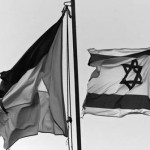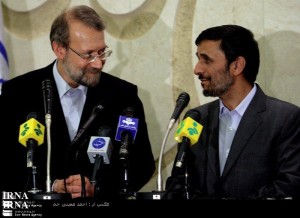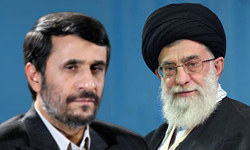The Latest from Iran (28 August): Music, Sanctions, and Science
 Saturday, August 28, 2010 at 21:30
Saturday, August 28, 2010 at 21:30  2020 GMT: Political Prisoner Watch (Cosmetics Edition). Minister of Intelligence Heydar Moslehi, who has been putting himself on front pages all week with tales of danger and how Iran's services are triumphing, does it again today by accusing the Swedish cosmetics firm Oriflame of trying to harm Iran's security: "Oriflame intended to fight the (Iranian) system. There are no economic reasons behind the company. We realised through the evidence that the arrogants (Western powers) and intelligence agencies sought to create security problems for the country through this company."
2020 GMT: Political Prisoner Watch (Cosmetics Edition). Minister of Intelligence Heydar Moslehi, who has been putting himself on front pages all week with tales of danger and how Iran's services are triumphing, does it again today by accusing the Swedish cosmetics firm Oriflame of trying to harm Iran's security: "Oriflame intended to fight the (Iranian) system. There are no economic reasons behind the company. We realised through the evidence that the arrogants (Western powers) and intelligence agencies sought to create security problems for the country through this company."Oriflamme's chief financial officer Gabriel Bennet responded, "We are a cosmetics company, we are selling direct. We are of course not involved in any political activities in the country (Iran). It is very very difficult to comment on [the accusations]."
On 22 August, Iranian authorities closed Oriflamme's Tehran office and arrested five employees, reportedly on charges that the company was running a pyramid scheme.
NEW Iran: Obama Rejects a Public “Red Line” on Nuclear Capability (Porter)
NEW Iran Music Special: The Kanye West No-War Rap
NEW Iran: Conservatives v. Ahmadinejad (Jedinia)
NEW Iran Special: The Supreme Leader and One Voice on Nuclear Talks with US?
The Latest from Iran (27 August): One Voice in Iran?
1625 GMT: The American Detainees (cont.). There is chatter, amidst the statement of Minister of Intelligence Heydar Moslehi that the case of Shane Bauer, Sarah Shourd and Josh Fattal "is nearing its end", that the US hikers could be released before the end of Ramadan.
There have been a number of moments over the last 13 months when there were indications that freedom was imminent, and each time hopes have been dashed. So the attitude might be "believe it when we see it".
The lesson could be --- as with many other cases and seen this week in the campaigns for Sakineh Mohammadi Ashtiani (see 1415 GMT) and Shiva Nazar Ahari --- that pressure not be relaxed for justice and resolution of the situation.
1500 GMT: Political Prisoner Watch. Ten days after he was summoned back to prison, journalist/filmmaker Mohammad Nourizad has finally been allowed to see his family.
Reformist politician Mostafa Tajzadeh, who also returned to detention and shares a cell with Nourizad, has written an open letter to the Tehran Prosecutor General. In the message, he talks about seeing his wife after 11 days incommunicado.
1435 GMT: The American Detainees. Minister of Intelligence Heydar Moslehi has said the case of three detained American nationals --- Shane Bauer, Sarah Shourd and Josh Fattal --- is near closure: "The investigations in the case of the three (Americans) is nearing its end and the verdict to be announced soon."
The trio were arrested in July 2009 when they allegedly crossed an unmarked border into Iran while hiking in Iraq's Kurdistan region.
1420 GMT: Political Prisoner Watch. HRANA reports that the four-year prison sentence for human rights activist Mahboumeh Karami has been confirmed.
1415 GMT: Political Prisoner (Ashtiani) Watch. The Iranian judiciary has released a statement on the case of Sakineh Mohammadi Ashtiani, sentenced to death for adultery.
The judiciary, implicitly recognising the international presssure for clemency and/or freedom for Ashtiani, said that the rights of all citizens were defended; however, the charges of adultery and complicity in her husband's murder had been proven against the 43-year-old woman.
1120 GMT: Diplomatic Service. Iranian official Mohammad Reza Sheibani Rauf has defended the President's appointment of four special representatives, including Chief of Staff Esfandiar Rahim-Mashai, for areas of foreign policy. He claimed this was "not uncommon" and cited the example of the US.
Rauf also noted that the President's office had appointed a Special Representative on Caspian Affairs in the past.
1100 GMT: The Battle Within. Leading conservative Morteza Nabavi has criticised the President for his failure to attend meetings of the Expediency Council, saying this was a "legal claim" as well as a political issue.
Nabavi noted the possible conflict between Mahmoud Ahmadinejad and the head of the Expediency Council, Hashemi Rafsanjani, but said both should reject "inflexible positions" and show an example of "political maturity" in reaching resolutions.
0900 GMT: Uranium Watch. Peyke Iran, drawing from Asr-e Iran, claims that Moscow is unsure about Tehran's proposal for a joint consortium to produce fuel for the Bushehr nuclear plant.
0850 GMT: Political Prisoner Watch. Dr. Shiravi, Professor of Mechanical Engineering and former Dean of Shahid Chamran University in Dezfoul, has been arrested.
0615 GMT: Political Prisoner Watch. Muhammad Sahimi, writing in Tehran Bureau, has a lengthy profile of Shiva Nazar Ahari, the activist detained since July 2009 and facing death on the charge of "mohareb" (war against God).
0610 GMT: Economy Watch. Street Journalist, relaying an item we saw in Peyke Iran, quotes Ali Deghan Kia, a member of the Higher Islamic Council Association Board, who says there has been a 40% increase in unemployment in manufacturing and "more than 90 percent of productive units transferred to the private sector are at risk of bankruptcy”.
Deghan Kia blamed "uncontrollable importation and smuggling of Chinese goods [as] the number one cause for unemployment....Every billion dollars of smuggled good entering the country is responsible for unemployment of 25,000 workers in Iran.”
0600 GMT: Academic Corner. Science follows up on the firing of Professor Yousef Sobouti, the astrophysicist and founder-director of the Institute for Advanced Studies in Basic Sciences who was Chancellor of Zanjan University. It claims that Sobouti's replacement, Rasoul Khodabakhsh, is a "nuclear scientist known to have links with the pro-government Basij militia".
Science that the Government has also replaced the leaders of at least 17 other academic and scientific institutions over the past month, including the chancellors of Sharif University of Technology in Tehran, the University of Golestan in north Iran, and Arak University.
0545 GMT: We open Saturday with a music special, as Kanye West and Jay-Z put out a rap against war with Iran.
Meanwhile, the Swiss energy group EGL spins another message, saying that 18 billion Euro ($23 billion) gas contract with the National Iranian Gas Export Company is not affected by American sanctions: “We are not violating any regulations, and follow rules; we feel we are not really deserving to come on the sanctions list.”
“Using of the revenues by Iran from the EGL deal to finance terrorism and its allies Hamas and Hizbullah. That is speculation. We do not pay money for supporting terrorism. I cannot really comment on such a speculation,” spokeswoman Lilly Frei said.
Last week EGL put out a somewhat different rationale: “As we noted in the past when this deal was first announced, oil and gas deals with Iran send the wrong message when Iran continues to defy UN Security Council resolutions. We have raised our concerns with the Swiss government about this arrangement on multiple occasions."
However, Frei is now saying, “We have a contract with the company, not with Ahmadinejad." Asked about other connections, Frei said EGL did “not know if the Iranian Revolutionary Guard Corps is affiliated with National Iranian Gas Export Company".
 Ali Deghan Kia,
Ali Deghan Kia,  Asr-e Iran,
Asr-e Iran,  Bushehr nuclear plant,
Bushehr nuclear plant,  Esfandiar Rahim-Mashai,
Esfandiar Rahim-Mashai,  Expediency Council,
Expediency Council,  HRANA,
HRANA,  Hashemi Rafsanjani,
Hashemi Rafsanjani,  Heydar Moslehi,
Heydar Moslehi,  Josh Fattal,
Josh Fattal,  Mahboubeh Karami,
Mahboubeh Karami,  Mahmoud Ahmadinejad,
Mahmoud Ahmadinejad,  Mohammad Nourizad,
Mohammad Nourizad,  Mohammad Reza Sheibani Rauf,
Mohammad Reza Sheibani Rauf,  Morteza Nabavi,
Morteza Nabavi,  Mostafa Tajzadeh,
Mostafa Tajzadeh,  Muhammad Sahimi,
Muhammad Sahimi,  Oriflamme,
Oriflamme,  Peyke Iran,
Peyke Iran,  Rasoul Khodabakhsh,
Rasoul Khodabakhsh,  Russia,
Russia,  Sakineh Mohammadi-Ashtiani,
Sakineh Mohammadi-Ashtiani,  Sarah Shourd,
Sarah Shourd,  Science magazine,
Science magazine,  Shane Bauer,
Shane Bauer,  Shiva Nazar Ahari,
Shiva Nazar Ahari,  Street Journalist,
Street Journalist,  Tehran Bureau,
Tehran Bureau,  Yousef Sobout,
Yousef Sobout,  Zanjan University in
Zanjan University in  Middle East & Iran
Middle East & Iran 



